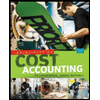
Financial And Managerial Accounting
15th Edition
ISBN: 9781337902663
Author: WARREN, Carl S.
Publisher: Cengage Learning,
expand_more
expand_more
format_list_bulleted
Question
Chapter 25, Problem 4PA
a)
To determine
Prepare the differential analysis of Company DS as on March 24 to decide whether to sell Raw Sugar or process it further to Refined Sugar.
b)
To determine
Provide some recommendations for Company DS.
Expert Solution & Answer
Want to see the full answer?
Check out a sample textbook solution
Students have asked these similar questions
You answered my 3 questions but i will not give unhelpful but if you will give anymore deslikes in my answers i will start also.
i am posting questions you also can answer i will not give unhelpful.
See the screenshot i attached below..
None
Can you help me solve this General accounting problem using the correct accounting process?
Chapter 25 Solutions
Financial And Managerial Accounting
Ch. 25 - Explain the meaning of (A) differential revenue,...Ch. 25 - A company could sell a building for 250,000 or...Ch. 25 - A chemical company has a commodity-grade and...Ch. 25 - A company accepts incremental business at a...Ch. 25 - A company fabricates a component at a cost of...Ch. 25 - Prob. 6DQCh. 25 - In the long run, the normal selling price must be...Ch. 25 - Although the cost-plus approach to product pricing...Ch. 25 - How does the target cost method differ from...Ch. 25 - Prob. 10DQ
Ch. 25 - Lease or sell Plymouth Company owns equipment with...Ch. 25 - Prob. 2BECh. 25 - Make or buy A company manufactures various-sized...Ch. 25 - Replace equipment A machine with a book value of...Ch. 25 - Process or sell Product J19 is produced for 11 per...Ch. 25 - Prob. 6BECh. 25 - Product cost markup percentage Green Thumb Garden...Ch. 25 - Prob. 8BECh. 25 - Differential analysis for a lease or sell decision...Ch. 25 - Prob. 2ECh. 25 - Differential analysis for a discontinued product A...Ch. 25 - Differential analysis for a discontinued product...Ch. 25 - Prob. 5ECh. 25 - Decision to discontinue a product On the basis of...Ch. 25 - Make-or-buy decision Somerset Computer Company has...Ch. 25 - Make-or-buy decision for a service company The...Ch. 25 - Machine replacement decision A company is...Ch. 25 - Differential analysis for machine replacement...Ch. 25 - Sell or process further Calgary Lumber Company...Ch. 25 - Sell or process further Dakota Coffee Company...Ch. 25 - Decision on accepting additional business...Ch. 25 - Accepting business at a special price Box Elder...Ch. 25 - Prob. 15ECh. 25 - Product cost method of product pricing La Femme...Ch. 25 - Product cost method of product costing Smart...Ch. 25 - Target costing Toyota Motor Corporation (TM) uses...Ch. 25 - Target costing Instant Image Inc. manufactures...Ch. 25 - Product decisions under bottlenecked operations...Ch. 25 - Prob. 21ECh. 25 - Total cost method of product pricing Based on the...Ch. 25 - Variable cost method of product pricing Based on...Ch. 25 - Differential analysis involving opportunity costs...Ch. 25 - Differential analysis for machine replacement...Ch. 25 - Differential analysis for sales promotion proposal...Ch. 25 - Prob. 4PACh. 25 - Prob. 5PACh. 25 - Product pricing using the cost-plus approach...Ch. 25 - Differential analysis involving opportunity costs...Ch. 25 - Differential analysis for machine replacement...Ch. 25 - Differential analysis for sales promotion proposal...Ch. 25 - Differential analysis for further processing The...Ch. 25 - Prob. 5PBCh. 25 - Product pricing using the cost-plus approach...Ch. 25 - Analyze Pacific Airways Pacific Airways provides...Ch. 25 - Service yield pricing and differential equations...Ch. 25 - Prob. 3MADCh. 25 - Service yield pricing and differential analysis...Ch. 25 - Aaron McKinney is a cost accountant for Majik...Ch. 25 - Prob. 3TIFCh. 25 - Prob. 4TIFCh. 25 - Accepting service business at a special price If...Ch. 25 - Prob. 6TIFCh. 25 - In differential cost analysis, which one of the...Ch. 25 - Prob. 2CMACh. 25 - Prob. 3CMACh. 25 - Oakes Inc. manufactured 40,000 gallons of Mononate...
Knowledge Booster
Similar questions
- What is the unit manufacturing cost under absorption costing in year 2020 ? General accounting questionarrow_forwardProvide a clear explanation for solving this financial accounting question.arrow_forwardOn January 1, 2018, Accounts Receivable was $25,000. Sales on account for 2018 totaled $180,000. The ending balance of Accounts Receivable was $38,000. What is the amount of cash collected from customers? a. $140,000 b. $167,000 c. $185,000 d. $195,000arrow_forward
- Corona Corporation has provided the following partial listing of costs incurred during August: Marketing salaries Property taxes, factory Administrative travel Sales commissions Indirect labor $ 49,000 $ 7,000 $ 1,04,000 $ 49,000 $ 38,000 Direct materials Advertising Depreciation of production-Equipment Direct labor Required: $ 1,38,000 $76,000 $ 54,000 $ 89,000 a. What is the total amount of product cost listed above? b. What is the total amount of period cost listed above?arrow_forwardCorrect solution by best expert...arrow_forwardTutor help me.arrow_forward
arrow_back_ios
SEE MORE QUESTIONS
arrow_forward_ios
Recommended textbooks for you
 Managerial AccountingAccountingISBN:9781337912020Author:Carl Warren, Ph.d. Cma William B. TaylerPublisher:South-Western College Pub
Managerial AccountingAccountingISBN:9781337912020Author:Carl Warren, Ph.d. Cma William B. TaylerPublisher:South-Western College Pub Principles of Cost AccountingAccountingISBN:9781305087408Author:Edward J. Vanderbeck, Maria R. MitchellPublisher:Cengage LearningPrinciples of Accounting Volume 2AccountingISBN:9781947172609Author:OpenStaxPublisher:OpenStax College
Principles of Cost AccountingAccountingISBN:9781305087408Author:Edward J. Vanderbeck, Maria R. MitchellPublisher:Cengage LearningPrinciples of Accounting Volume 2AccountingISBN:9781947172609Author:OpenStaxPublisher:OpenStax College

Managerial Accounting
Accounting
ISBN:9781337912020
Author:Carl Warren, Ph.d. Cma William B. Tayler
Publisher:South-Western College Pub

Principles of Cost Accounting
Accounting
ISBN:9781305087408
Author:Edward J. Vanderbeck, Maria R. Mitchell
Publisher:Cengage Learning

Principles of Accounting Volume 2
Accounting
ISBN:9781947172609
Author:OpenStax
Publisher:OpenStax College